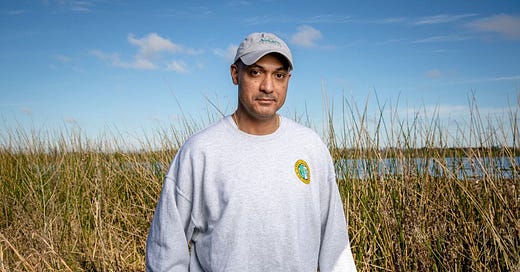Audacious Water Podcast: Charles Allen on What We've Learned in 20 Years Since Hurricane Katrina
One takeaway: Listen to great-grandmothers
Listen to Audacious Water: Season 4, Episode 8
In season four of my podcast, Audacious Water, I speak with ten diverse experts who intersect with how climate change is transforming America’s Heartland, which is becoming drier, hotter, saltier, wetter, and sicker. My goal was to deepen understanding of climate change and explore how to prepare and respond.
Why Charles Allen?
I recorded Episode 8 of this season of my podcast with Charles Allen, engagement director for the Audubon Delta Unit of the National Audubon Society and co-founder of the Lower 9th Ward Center for Sustainable Engagement and Development, just six months ahead of the 20th anniversary of Hurricane Katrina.
Charles has spent decades working on environmental justice and climate adaptation in New Orleans, and my conversation with him felt spiritual. He generously shared wisdom from his great-grandmother, “Grams,” who had a simple but powerful philosophy: Change is inevitable. The key is to step into it and help shape the change.
That directive is incredibly relevant to climate change adaptation, and it clearly guides Charles’ work in the Lower 9th Ward. Today, that neighborhood is a mix of empty lots and rebuilt homes. But in that patchwork, nature persists. The people of the community are embracing nature to abate flooding and creating nature-based solutions to stormwater management.
In the ashes of what we leave behind, we have the opportunity to build something new. That’s a kind of optimism that I think many people share–and we all need–to increase the pace and scope of adaptation.
Key Topics We Discussed
The Lasting Impact of Hurricane Katrina: Charles reflects on how Katrina reshaped New Orleans, influenced discussions about community resilience, and remains a defining moment for the city 20 years later.
The “Jack-O’-Lantern Effect” of Uneven Recovery: Charles describes how, 20 years after Katrina, the Lower Ninth Ward still has a patchwork of rebuilt homes surrounded by vacant lots, reflecting the uneven nature of redevelopment and the challenges that remain for the community.
Repurposing Vacant Lots for Climate Resilience: Charles discusses how the Lower Ninth Ward and other neighborhoods have transformed vacant lots into green infrastructure projects, such as rain gardens and water detention areas, to help manage flooding and increase climate resilience.
Civic Engagement in Disaster Recovery: Charles shares how neighborhood leaders participated in post-Katrina planning meetings, advocated for their community, and worked to implement sustainability initiatives to support long-term resilience.
Overcoming Climate Change Numbness and Disinformation: John and Charles explore how people can become desensitized to climate change, the challenge of staying engaged, and the importance of seeking credible information to remain informed.
Embracing Change Instead of Resisting It: Charles reflects on the wisdom of his great-grandmother, who taught him that change is inevitable, and explains why stepping into change is essential for shaping a stronger, more resilient future.
Money Quotes from Charles
“ Grams would say, ‘Don’t be afraid — step in. There’s an opportunity for you now to get involved in the change.’”
“20 years, that's now a generation since Katrina—I get concerned that people's sensibilities start to numb a bit….I get concerned, John, that 20 years later we're starting to say, “okay—oh yeah, let's not forget restoring our coastal wetlands," but [people] forget about the other aspects of climate change, okay? It's not just restoring the wetlands; it's a whole lot of other stuff.”
Links to Relevant Studies and Resources
Learn more about Charles on Audubon Delta’s website.
Learn more about the Lower 9th Ward Center for Sustainable Engagement and Development, co-founded by Charles, and its work on environmental justice and climate resilience.
Charles and John discuss the IPCC AR6 Climate Report, which outlines the science behind intensifying climate impacts.
Further Reading
Read about the City of New Orleans’ Climate Action Strategy and its resilience planning efforts.




